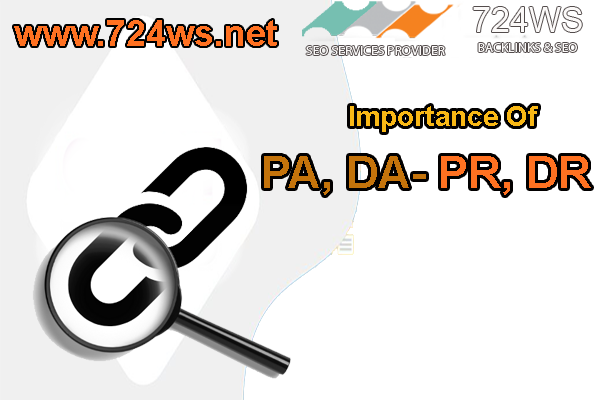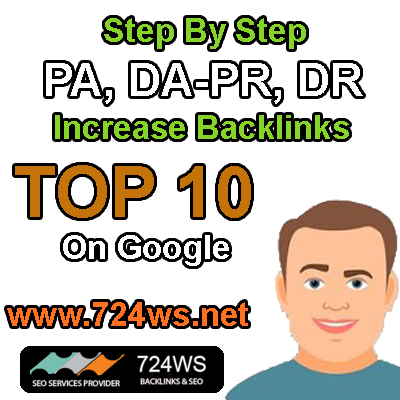Page Rank, Domain Rank, Page Authority And Domain Authority
Whereas page authority (PA) measures the expected rankings power of individual pages, domain authority measures power for whole domains or subdomains.
Domain Authority (DA) was created by the SEO company Moz in an effort to reverse-engineer the PageRank Score toolbar, which uses a 1-to-10 rating to assess the importance of a page in terms of how it is perceived by Google. Googles PageRank score was once used to let people see how authoritative pages were, based on how many, and what the quality, of links to them were.
In 2016, Google stopped publishing the publicly available Google PageRank (often called Toolbar PageRank) scores, so the sites domain authority score is a handy tool for replacing it.
Google used to display webpages PageRank publicly on the Google toolbar, but since black-hat SEOs used this information to aid in their rankings, Google now keeps the Googles PageRank scores locked away. While domains and page authority are created by Moz, PageRank, meanwhile, is created by Google, used to determine the importance and value of a site via inbound links.
Since PageRank evaluates page-based rather than site-based authority, internal links are just as important as external links. Google favors a link profile–a list of all the backlinks on your site–that is made up of links from a wide variety of sites as well as from highly authoritative sites. To create a powerful profile, or off-page SEO, you must have backlinks coming in from high-authority sites as well as relevant sites.
 If your posts are linked from high-authority websites, as well as being linked back to from other high-authority sites, you will score well. If your website has a good score, then that means that there is a high probability that it will rank well in the Search Engine Page Results (SERPs). The higher the score, the higher the domain authority, and the greater a pages chance to rank high in the SERPs.
If your posts are linked from high-authority websites, as well as being linked back to from other high-authority sites, you will score well. If your website has a good score, then that means that there is a high probability that it will rank well in the Search Engine Page Results (SERPs). The higher the score, the higher the domain authority, and the greater a pages chance to rank high in the SERPs.
Websites with low Page Authority and Domain Authority scores are considered to be less important or credible, and they typically will be lower ranked in Google searches. Your pages may receive higher PageRank values from links from less authoritative pages, as long as they typically use less citations. Some factors Moz uses to calculate domain authority (DA) are ranking factors for Google, such as number of links from a root domain and the number of pages linked.
In simple terms, one developed by Moz is a score used to forecast the ranking power of a site in SERPs, with a scale from one to 100.
Domain Authority, or DA, is a creation of Moz — the SaaS company — which is used to predict how likely your site is to rank on a search engine results page (SERP). Page authority, or PA, is based on data from the web indexes of Moz – a SaaS company, and several factors are taken into account in the calculation of the final score.
Using a metric similar to Moz, Semrush uses Semrush Authority Score which works holistically, which is similar to other authority metrics. Moz — the SaaS company — then uses the one-size-fits-all score to monitor the strength of the websites rankings, or compare websites over time. Identification occurs on an individual page level, and data used to compute a PA score takes into account more than 40 factors, including the number of links.
Page authority is calculated using an algorithm as well, but takes into account link counts and other factors to produce a 1 to 100-point score for an individual page.
Because of the way Page Authority (PA) is calculated (see the technical definition of Page Authority below), it is best used as a comparative measure (rather than as an absolute, specific score) when conducting search results research and determining which pages might have stronger or more prominent link profiles than others.
The key difference between Domain Authority and Page Authority is exactly what is being measured: In other words, Page Authority projects overall performance for a particular webpage specifically (i.e., one particular article within your site), while Domain Authority projects overall performance for your whole site.
While it might be tempting to solely focus on having a high Domain Authority score, remember that DA serves merely as a predictor of the ranking power of your website, and thus it should be used as a comparison measure. There are many ways you can confidently boost your domains overall authority, and subsequently, its DA score. With that in mind, your goal should not be to get the highest possible authority score, but rather, a higher authority score than that of your competitors.
Objectively, investing in your domains authority is better for the long-term, and will, given enough time, bring you higher traffic (since you will increase your rankings potential for a lot of pages at the same time). If you continually keep an eye on your link profile health, produce engaging content, and gain quality links, domain authority will slowly increase, improving your rankings and Google organic traffic in the long run. Of course, both page and domain authorities are important, and learning best practices in optimizing for each is crucial to your overall success, but teasing out what needs to be worked on is a major process of optimization itself.
For instance, SE ranking domain trust and page trust are both composite scores for the quality of a domain and a page, which are based on number and quality of backlinks and referring domains. For instance, one of the most well-known has been PageRank, an algorithm created by Googles Larry Page that is designed to measure the quality and authority of a particular webpage by the number, quality, and relevancy of links that point to it. Software-as-a-service company Moz.org developed an algorithm and weighted-level indicator, called domain authority, that provides predictions about the search engines rankings of a site, with a discriminating range of between 0 and 100.


